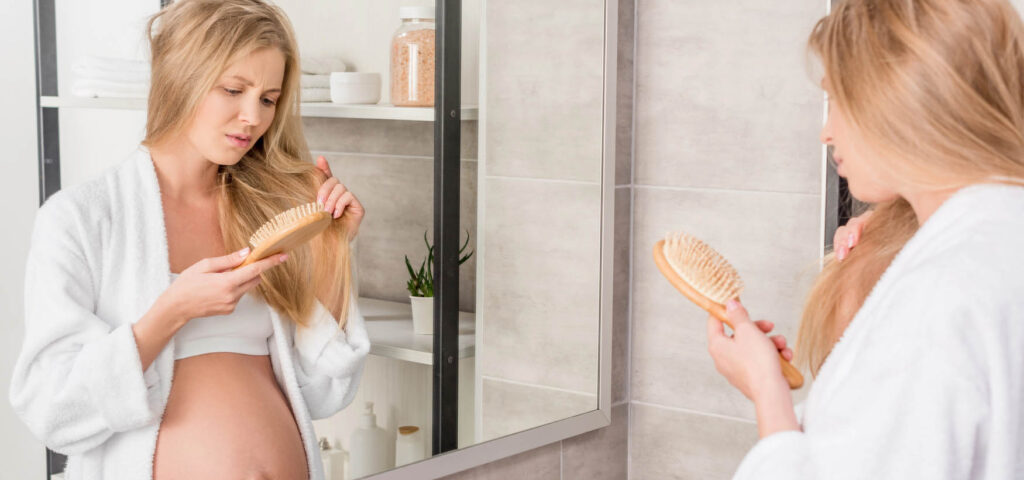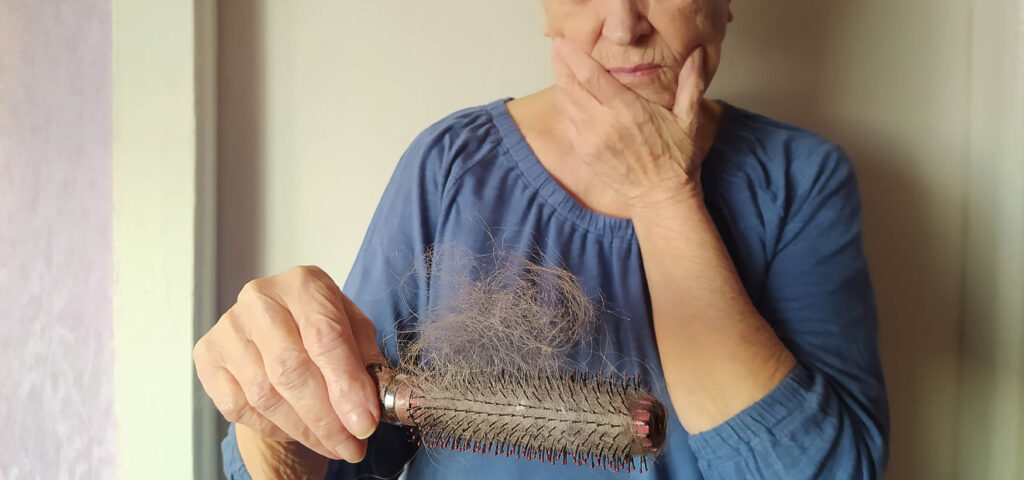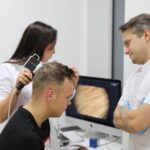Shedding is a natural stage of the hair growth cycle. It is estimated that we lose 50 to 100 hairs a day. These amounts are nothing to worry about. However, it sometimes happens that hair loss becomes more severe – as a result of diseases, vitamin deficiencies or hormonal changes. These types of changes are especially visible during pregnancy and menopause. Women going through this period often complain of significant hair thinning. How to deal with this problem?
How does pregnancy affect hair?
During pregnancy, a woman’s body undergoes numerous hormonal changes that affect her entire body. They also influence the hair growth cycle. Estrogens, which remain high during this period, prolong the active growth phase and delay the transition to the dying and shedding stage. Therefore, many pregnant women notice that their hair has become thicker, stronger and healthier. However, this is not always the case. Equally often, hair loss increases during this special period. The cause may be progesterone, another hormone that regulates pregnancy. Its effect on hair varies and is difficult to predict.

Significant hair loss is a problem that occurs very often after giving birth. Then the level of hormones changes once again – the amount of estrogen decreases, and the concentration of prolactin, which stimulates lactation, increases. This causes the hair to rapidly enter the next growth phase and begin to fall out. This is especially visible in women who noticed thickening of their hair during pregnancy. This process is sometimes called postnatal alopecia. It may last from several months to even a year. After this time, the condition of your hair should slowly start to return to normal.
Hair in women during menopause
Menopause is another stage in life during which major hormonal changes occur that affect the condition of hair. During this time, estrogen and progesterone levels drop significantly. This may result in mood swings, fatigue, joint pain and other ailments. Many women also notice slower hair growth and increased hair loss. The reason for this are hormones that shorten the growth phase. It is estimated that this problem occurs in over 50% of women going through menopause.

Unfortunately, unlike hair loss after pregnancy, menopausal alopecia is usually more permanent. The changes that occur with age are often permanent. However, this does not mean that there are no ways to deal with hair loss. There are various solutions that can help reduce the severity of the problem.
Non-hormonal causes of hair loss
It is worth noting that hormones may or may not affect the hair growth cycle of a given person. The causes of baldness vary. Both during pregnancy and menopause, women are exposed to stress. Intense and long-lasting nervous tension shortens the active growth phase and accelerates hair loss. New hair grows slower, so it is unable to quickly fill in the gaps. Moreover, in both periods the demand for certain nutrients increases, such as B vitamins, vitamin D, magnesium, iron, zinc and folic acid. Deficiencies of these microelements can weaken hair follicles and lead to baldness. Another cause of hair loss may be limited hair care. Lack of time or low mood often mean that we limit self-care to the minimum necessary. It also affects the condition and density of the hairstyle. It is also worth remembering that not all cosmetics are recommended for use during pregnancy. There may be many causes of hair loss and they may co-occur. This is a complex problem that affects many women.
How to find the cause of baldness?
In the case of excessive hair loss, the best solution is to go to a doctor and get diagnosed. Laboratory tests will be helpful in this process. It is usually recommended to check the level of iron, ferritin and vitamin D. A basic blood count is also very informative, revealing problems such as anemia or inflammation. It is also worth checking TSH, FT3 and FT4 – hair loss may result from impaired thyroid function. Diabetes, which often accompanies pregnancy, has a negative impact on hair follicles. If it is detected, it must be controlled. Read more: What tests should be performed for hair loss? It is worth remembering that hair loss during periods of such intense changes in the body is natural and is usually not a cause for concern. However, if it lasts for a very long time or is very severe, it is worth considering consulting a dermatologist or trichologist. The specialist will help you find the source of the problem and select appropriate therapy. Properly tailored treatment can significantly improve the condition of your hair and slow down hair loss.
Home remedies for strengthening hair
For many women, thinning and weakened hair causes low mood and self-esteem. This is hardly surprising. One of the easiest ways to reduce the severity of this problem is to eat a healthy, balanced diet. Meals rich in protein, iron, zinc and vitamins will strengthen the entire body, including hair. Adequate hydration is also very important, especially when pregnancy is accompanied by vomiting or intestinal disorders. It happens that additional supplementation is needed. It is most often recommended to take omega-3 acids, vitamin D and folic acid. Pregnant women should consult this matter with their doctor. You can also take care of gentle care in the comfort of your own home. It will be a good idea to avoid aggressive cleansers and use moisturizing and protective conditioners. Gentle products are highly effective and do not cause damage. It is a good idea to set the dryer to a cool setting, which will close the hair cuticles. It may be a good idea to precede washing with a scalp massage – even a few minutes of gentle massaging stimulates microcirculation and improves the nourishment of hair follicles.
Treatment of hair loss
It happens that the problem of scalp hair loss is so severe that home remedies do not bring the expected results. In such cases, you can seek help from cosmetology and aesthetic medicine. There are various treatments that can stimulate blood circulation in the scalp and stimulate hair growth. These include:
- needle mesotherapy of the scalp – it involves injecting nutrients into the skin that have a beneficial effect on the skin and hair,
- Platelet-rich plasma – a preparation made from blood collected from the patient, supports tissue regeneration and stimulates dormant hair follicles,
- laser therapy – laser light improves microcirculation and reduces hair loss.
Please remember that not all treatments are recommended during pregnancy and lactation. If you want to do it, it is worth consulting with an experienced specialist. In some cases, especially advanced ones, the doctor may suggest drug therapy. There are preparations available on the market for topical and oral use that extend the hair growth phase or regulate the impact of hormones on the body, restoring hormonal balance.
For the sake of healthy hair
Increased hair loss and weakening are natural effects of hormonal changes that occur during pregnancy and menopause. Although these changes can be difficult and often cause frustration, it is worth being aware that there are ways to regenerate and restore a healthy appearance. A balanced diet and adequate hydration of the body are of great importance in this context. If the problem is very advanced, you can get support from specialists.
It should not be forgotten that the scalp and hair need time to rebuild and return to their natural state. It is a complex process that may take many months. Sometimes, a multi-pronged approach to the treatment of baldness is necessary. It is worth being patient during this period, taking care of your mental health and remembering to rest. Stress is one of the causes of hair loss, so it should be avoided.


